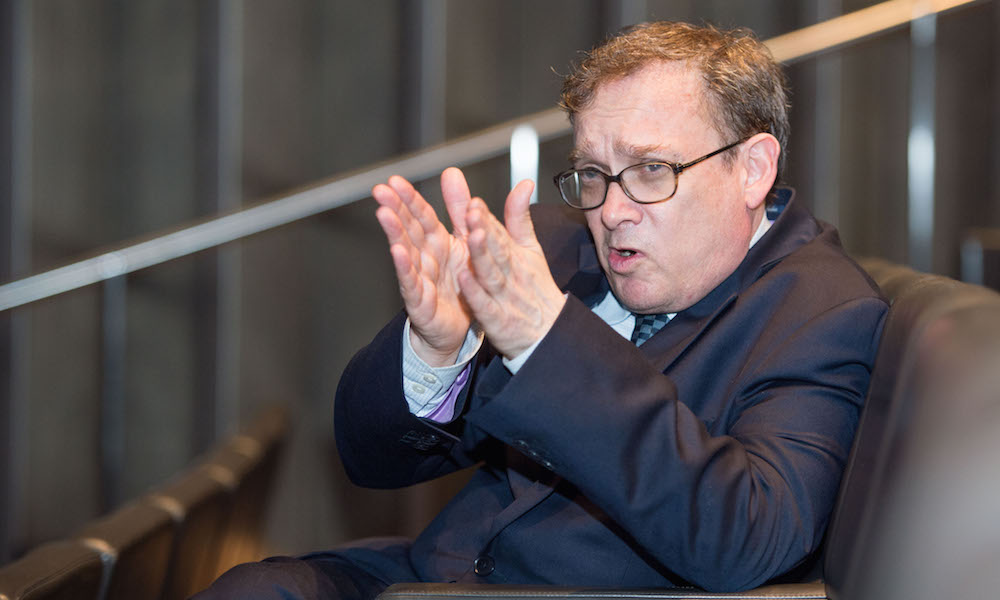
Zocalo Public Square presents "What It Means To Be American" Panel Discussion at the British Museum, London, March 9th 2016
Adrian Wooldridge is the political editor and “Bagehot” columnist at the Economist. In advance of the Zócalo event, “Is There Still Merit in a Merit-Based System?,” which was inspired by his latest book, The Aristocracy of Talent: How Meritocracy Made the Modern World, he chatted in the green room about pandemic productivity, his inability to quit chocolate, and what he’d study if he could go back to school today.
How has the pandemic changed the way you work, if at all?
It’s moved me entirely to my own home, and it’s a massive improvement in my life because it’s cut out the commuting, it’s cut out the time wasted in my office. I’ve written two books in the pandemic. If we have a permanent pandemic, my productivity would be astonishing.
Do you have any recurring dreams or nightmares?
My recurring dream is that I have to do my Oxford finals again, and get a first. The Oxford finals, when I did them, consisted of 10 papers. Each paper was three hours, and we had to do them in five days. It was an endurance test more than it was an intellectual test. I keep having this dream that I have to do them all again, and I have to do all the papers—but I haven’t done anything.
Speaking of Oxford, if you could go back to school today, what would you study?
I think I’d still study history, which is what I did study, but I think I would study different bits of history. When I was at university, I studied very modern history, as modern as possible. I would study ancient and medieval history much more. I think I’d focus on antiquity and the Middle Ages, up to the late Middle Ages.
What advice do you give to aspiring journalists?
I’m tempted to say, “Don’t do it.” [If they insisted], I would advise them as much as possible not to become internet fodder, reprocessing other people’s words into tweets and material for the internet, but to use journalism as a way of immersing yourself in reality. So do as much reporting as possible, go to places, talk to people, experience things. Don’t just sit at your desk, feeding stuff into the internet.
How do you define meritocracy as briefly as possible for someone who’s not familiar with the word?
Meritocracy equals IQ plus effort, minus bias.
What do you wake up to?
My dog licking me. Which is not a pleasant thing, but it wants to be fed and that’s how it communicates. I get up, and I feed the dog, and that’s the beginning of every day. The dog will not wait.
What is the last song that got stuck in your head?
This is a very pretentious answer, and I apologize for the pretentiousness of it, but I went to see [Béla] Bartók’s opera called Bluebeard’s Castle, which is very modern and very discordant and very difficult to listen to, but at the very end of it, when the wife opens the [final] door, there’s an incredibly beautiful piece of music in which [Bluebeard] sings about his love for his wife and seeing her in the moonlight, and you go from a very discordant score to this incredibly lyrical thing, and it stuck very much in my head as I was listening to it.
What’s your proudest accomplishment?
Apart from getting married and having children and those things, which are obviously more important than anything else, writing my last book [The Aristocracy of Talent]. It is my best book.
You’re based in London. What have you missed most about trans-Atlantic travel during the pandemic?
My infusion of American energy. I find going to America is sort of like a shot of cultural and intellectual adrenaline.
Your last two Zócalo green room interviews spotlighted your inability to quit chocolate, so we must keep the tradition going here. What’s the last chocolate item you consumed?
I did consume a piece of chocolate this afternoon. I went to the tip [the dump] to throw away a load of bottles, and I couldn’t resist going to a shop and buying some chocolate, which I shouldn’t have done. It is harder to quit than cigarettes.



